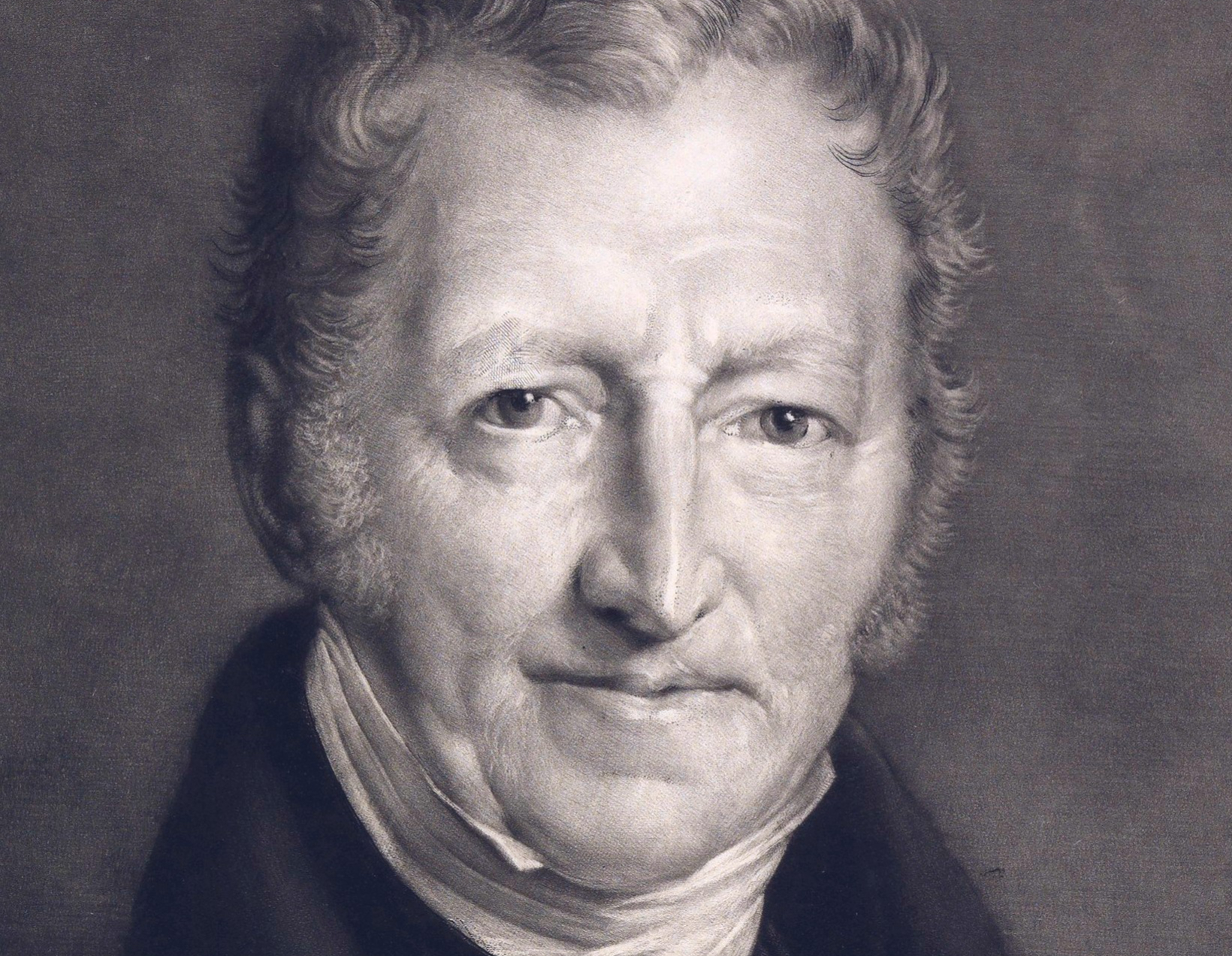Education
Past Informs the Present

The work of the eighteenth-century English economist Thomas Malthus has been famously used to defend the indefensible. Malthus’s warning of the dangers of overpopulation, labor redundancy, and environmental degradation in urban-industrial societies have served as the basis for programs ever since that are aimed at curtailing political liberty.
Malthus, dark voice from the past
Today, World Economic Forum (WEF) founder Klaus Schwab has addressed the problems of industrialization and population redundancy in highly Malthusian ways. With the advent of artificial intelligence and other new technologies, Schwab has stated that employees are bound to “face redundancy unless they can migrate to a new position with an organization.”
Yuval Noah Harari, a key WEF advisor, likewise agrees that technological advancements have created an atmosphere where a sizable decrease in the world’s population will happen in the next decades. Harari has noted that “these technologies will increasingly make redundant and will make it possible to replace the people.” Replaced people, he adds, will become “useless eaters,” straining both subsistence and the global footprint.
Antebellum political economists at major Southern universities instructed students – future southern leaders – in these Malthusian ideas in a completely different context than our own. Like Schwab, Harari, and the WEF, leading Southern intellectuals at that time fostered an intense commitment to an anti-democratic philosophy invested in the regulation of human populations, movement, political independence, and economic freedom.
Slaveholders loved him
According to the historian Eugene Genovese, slaveholders embraced Malthusianism, because they “viewed with foreboding the laws of diminishing returns in agriculture … and of the tendency of population geometrically to outstrip subsistence.” Southern apologists concluded, Genovese writes, that in an industrialized free labor society “‘the masses of mankind’ are inescapably ground up if they did not rise with fearful violence to destroy the social classes that imposed misery upon them.” It was for this reason that slave apologist Daniel Hundley believed Malthus’s writings to be a “great science” for shaping society.
William and Mary President Thomas R. Dew, a notable apologist for slavery, also made these arguments prominent in his defense of the “peculiar institution.” Dew postulated that if Southern society gave way to Northern industrialization, “the powerfully elastic spring of our rapidly increasing numbers … shall be crowded into our manufactories and commercial cities – then will come the great and fearful pressure upon the engine.” Whereas Northern industrialism hastened a degraded “rural landscape,” giving way “to factories, tenants, and large cities,” Dew contended that slaveholders believed their agricultural society achieved a perfect balance between populations and resources.
Modern Malthus enthusiasts use the environment as an excuse
Like antebellum Southerners who, according to historian David Silkenat, used the fear of “environmental destruction” to elevate their low population agrarian philosophy, environmentalists today see the “impact of population” and industrialization as combining to “deplete natural resources and degrade the environment.” Population and industrial growth, therefore, must be controlled.
But how can this be achieved? Vice President Kamala Harris stated that “when we invest in clean energy, and electric vehicles, and reduce population, more of our children can breathe clean air and drink clean water.” Of course, Harris leaves the best means of implementing depopulation and regulating economic freedom unanswered.
Ultimately, the perspective put forward by Vice President Harris is not entirely different in principle from some of the solutions offered by leading slaveholders. They endeavored to limit urban industrialization, mocked urban boosters as un-Southern, and posited that the best way to regulate populations was through eugenics – “manipulate the sex ratio.”
As in the past, such ideas are not friendly to liberty
The issue with Malthusianism, both past and present, is obvious. How could population and industrial reduction occur if not by curtailing private industry, economic freedom, and an individual’s reproductive autonomy? If accepted wholesale, our nation’s tradition of political liberty would be shoved aside for a program based on a very different set of principles.
Antebellum Southern history teaches us that this ideology gives rise to anti-democratic philosophies opposed to bodily freedom, economic liberty, and political independence. The language of collapse inherent in this ideology serves as a powerful tool in undermining the power of individuals to enjoy life, liberty, and the pursuit of happiness on their own terms. It is therefore useful to see the Malthusianism of the pre-Civil War South as a warning. After all, the past often informs the present.
This article was originally published by RealClearHistory and made available via RealClearWire.
Howell Keiser is a Post-Doctoral Research Associate at the University of Virginia and is a fellow with the Jack Miller Center.
-

 Accountability3 days ago
Accountability3 days agoWaste of the Day: Principal Bought Lobster with School Funds
-

 Executive1 day ago
Executive1 day agoHow Relaxed COVID-Era Rules Fueled Minnesota’s Biggest Scam
-

 Civilization9 hours ago
Civilization9 hours agoWhy Europe Shouldn’t Be Upset at Trump’s Venezuelan Actions
-

 Constitution2 days ago
Constitution2 days agoTrump, Canada, and the Constitutional Problem Beneath the Bridge
-

 Civilization1 day ago
Civilization1 day agoThe End of Purple States and Competitive Districts
-

 Christianity Today9 hours ago
Christianity Today9 hours agoSurprising Revival: Gen Z Men & Highly Educated Lead Return to Religion
-

 Civilization5 days ago
Civilization5 days agoThe devil is in the details
-

 Executive21 hours ago
Executive21 hours agoWaste of the Day: Can You Hear Me Now?












